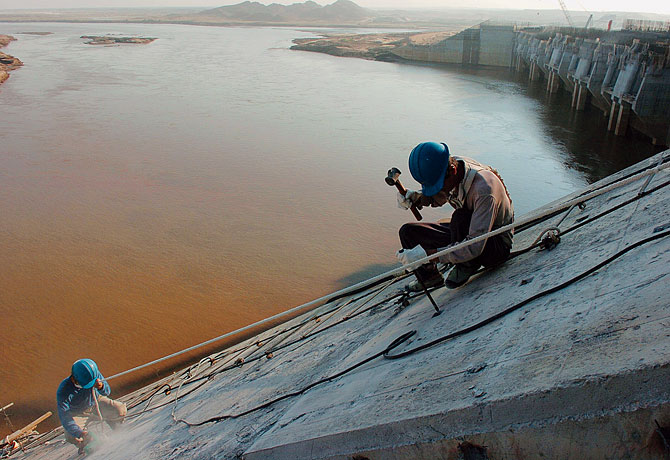
Help from afar
Chinese laborers work on Sudan's Merowe Dam, built by a Chinese company, in 2007
As the sun sets over the tiny village of Djeguenina in southeastern Mali, two women stand while pounding corn to cook for dinner near a smoldering fire outside the mud dwellings. Seated nearby, the village chief describes the grueling life of the community's 250 people, who subsist largely by selling firewood by the roadside. "People are sick, we have no school, there is no work," Chegoudou Diakité says. "Life is extremely hard."
No politician has ever visited Diakité's village; probably none has ever heard of it. Yet when world leaders gather in Italy on July 8-10 for a Group of Eight (G-8) summit, the problems of this dot on the map, and countless others in Africa, will likely be the subject of intense debate. At a previous G-8 summit in 2005, member nations vowed to boost aid to Africa by nearly $22 billion over five years in a bid to finally end grinding poverty and chronic disease by tightly coordinating work on problems such as education, water and major epidemics. At the time it seemed like a workable plan. But amid the deepest recession in decades in each G-8 country — the U.S., Britain, France, Italy, Germany, Russia, Canada and Japan (with the European Union as an observer member) — big-ticket promises to Africa have become increasingly difficult to keep. Four years since their commitment, the G-8 nations have spent only $7 billion. While Britain and the U.S. have increased aid to Africa, and Japan and Canada have given more than they promised, two members have virtually abandoned the program: Italy, this year's rotating G-8 head, has given a miniscule 3% of its commitment, and France has given 7%, according to a report by ONE, a London-based organization founded by singer Bono, which tracks G-8 aid to Africa.
The summit has other urgent issues on the table, of course, such as climate change and the global financial crisis, which the G-8 chairman, Italian Prime Minister Silvio Berlusconi, recently said was a priority. But as the club of rich nations struggles to be taken seriously (many argue the G-20 more accurately reflects the distribution of economic power in the world today), unkept promises to Africa will matter — especially since the recession has fueled discussions and doubts about whether big aid programs are really worth their high cost. In the current climate, officials for African aid organizations say they fear programs could be hit even harder next year as wealthy nations try to regain control of budgets bloated by financial-system bailouts and economic-stimulus packages. Oxfam estimates the global recession could cut more than $8 billion from the total five-year, $50 billion commitment by G-8 countries made in 2005.
Further cuts in assistance could be disastrous for Africa, which has just begun to feel the effects of the global crisis after a decade in which much of the continent saw solid economic growth. That growth is being threatened by a plunge in demand for Africa's oil, copper, gold, platinum, diamonds and other natural riches, which has driven prices back to 2005 levels. The International Monetary Fund (IMF) predicted in April that sub-Saharan Africa's overall annual growth rate would drop from about 5.5% last year to about 1.5% this year. That's still much better than the contraction that most rich countries will see. But it is below the 3% rate at which Africa's population expands each year, and so could potentially turn the recession into a major crisis — even a deadly one. The World Bank, whose president Robert Zoellick in April warned of a potential "human catastrophe" in Africa as a result of the recession, estimates that an additional 700,000 African children could die of disease and malnutrition for each year that the downturn lasts. "We think of recessions in the West as temporary, where people lose jobs and perhaps houses," says Shantayanan Devarajan, World Bank chief economist for Africa. "When the economy picks up they will get new jobs and new houses. But in Africa, when there is a slowdown, people can be forced to take children out of school, or infants can die."